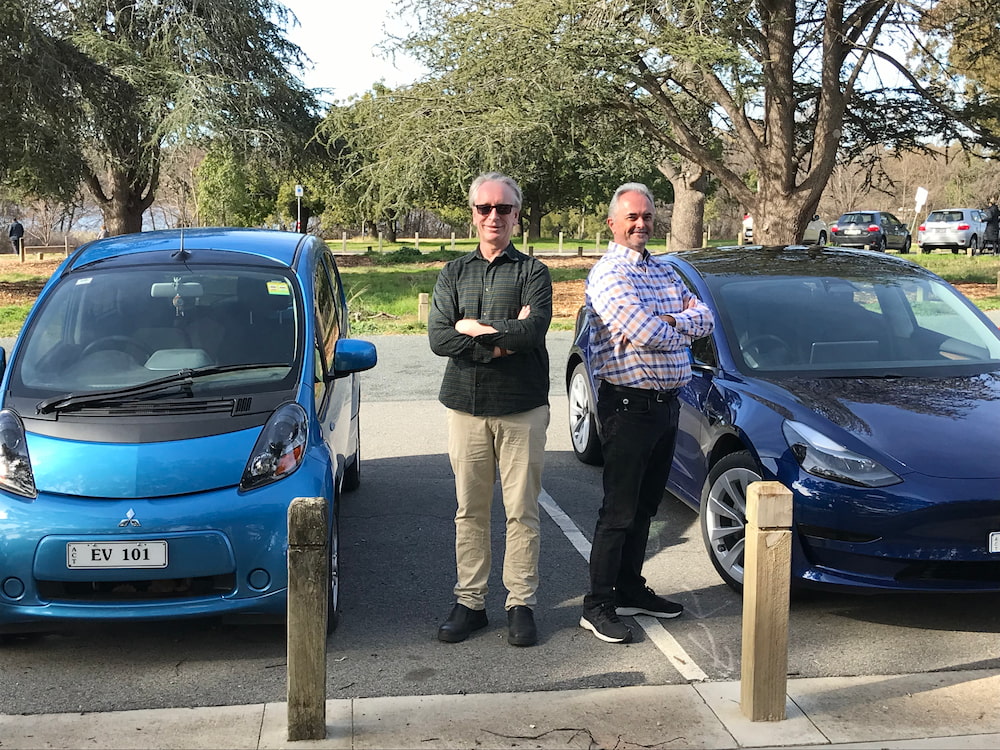Canberra drivers are taking up electric vehicles in a big way. More than 1,200 electric vehicles have been registered in the ACT – 200 of them since the ACT Government waived registration costs two months ago. On 24 May, 987 ZEVs had been registered in the ACT; two months later, 1,206 had been registered.
“These incentives are absolutely brilliant and should be carried out across the whole of Australia,” Karl Goiser believes. “This is really important to move away from burning fossil fuels.”
Mr Goiser was one of the first people in the ACT to own an EV; he bought his first in 2011, and another last year. In the early days, he said, it was unusual to see another EV on the road. “Now, thank goodness, I see an EV almost every time I drive around Canberra.”
Peter McNeil registered the Territory’s thousandth vehicle, a Tesla – a smoother, environmentally friendlier drive than a gas-guzzler.
“It’s nice to know there are a thousand,” Mr McNeil said. “When I’m driving along the roads, of course, it feels like there are more than a thousand cars out there.”
Mr McNeil said he has known about climate change for nearly 30 years, and is keen to help the environment. He has installed solar panels, insulated his house, and put in solar hot water (which dramatically reduced his energy bills).
“But the last step in getting rid of the emissions is to get an emissions-free vehicle.”
Mr McNeil said he had wanted an electric vehicle for 13 years. “When I bought my old car, I said that was the last internal combustion engine car I was going to buy, because I thought electric cars were coming sooner than that.”
When that car aged, he ordered a Tesla from the US, which arrived three months later. The EV cost $70,000 – a good $20,000 more than he wanted to pay. But he says it’s worth it.
“Anyone who likes a little bit of power in their car, likes to put their foot down, would be absolutely hooked by the Tesla. If anything, it’s probably a little too fast – but it’s really smooth to drive, really easy to drive, exceptionally easy to drive. In stop-start traffic, there’s nothing to do, and it’s really, really comfortable.”
More so than a normal petrol car. “I’ve still got my old car. When I get back into that and drive it, I realise exactly how far we’ve come.”
The Tesla has a range of 5,000 km – enough to easily get to his parents’ house in Walla Walla (near Albury-Wodonga), once travel restrictions lift.
Charging is easy, Mr McNeil says; he drives home, parks it in the garage, and plugs it into the charger. “By the time I’ve watched the news, the car’s charged and ready to go for the next day.”
Karl Goiser bought his Mitsubishi i-MiEV in 2011, when it was one of only two models available. He has been as pleased with it as Mr McNeil is with his Tesla.
“It’s a lovely town car. You just do whatever you like with it. Zip around. It’s very small, and has a very small turning circle, so you can park in small spaces. The perfect city car!”
Over the last decade, Mr Goiser has seen more people accept them as they understand cars’ contribution to the climate crisis.
“People were very much against them; now, there’s a huge uptake in electric vehicles,” he said. “The electric vehicles don’t pollute beyond when you buy them. So it’s a no-brainer, really.”
The only problem is the car’s limited range. “It’s old; it’s the same battery technology as your laptop.” But it’s enough for shopping or driving around Canberra, Mr Goiser said. And his second electric car, bought last year, has a 400km range – plenty for a trip to Sydney or Cessnock.
“The idea of range now is just out the door, really. We just love it; electric vehicles are the future.”
But Australia still has a reputation as “a uniquely hostile market”, the Electric Vehicle Council said earlier this year.
Even though more Australians are buying EVs (purchases increased 2.3% last year, and the number of registrations rose 63%), less than 1% of new sales are EVs – compared to 10% in the EU, 11% in the UK, and 75% in Norway.
“It makes me feel very sad to know that there are around 200 models of electric car available worldwide – and about 12 in Australia,” Mr Goiser said. “Manufacturers are very reluctant to bring their cars in because they know that the government doesn’t support them.”
Angus Taylor, Federal Minister for Energy and Emissions Reductions, recently said he would not drive an electric vehicle, and the Federal Government’s Future Fuels Strategy has been criticised for lacking financial support to buy electric cars, targets for new EV sales, or minimum fuel emissions standards.
For more news:



